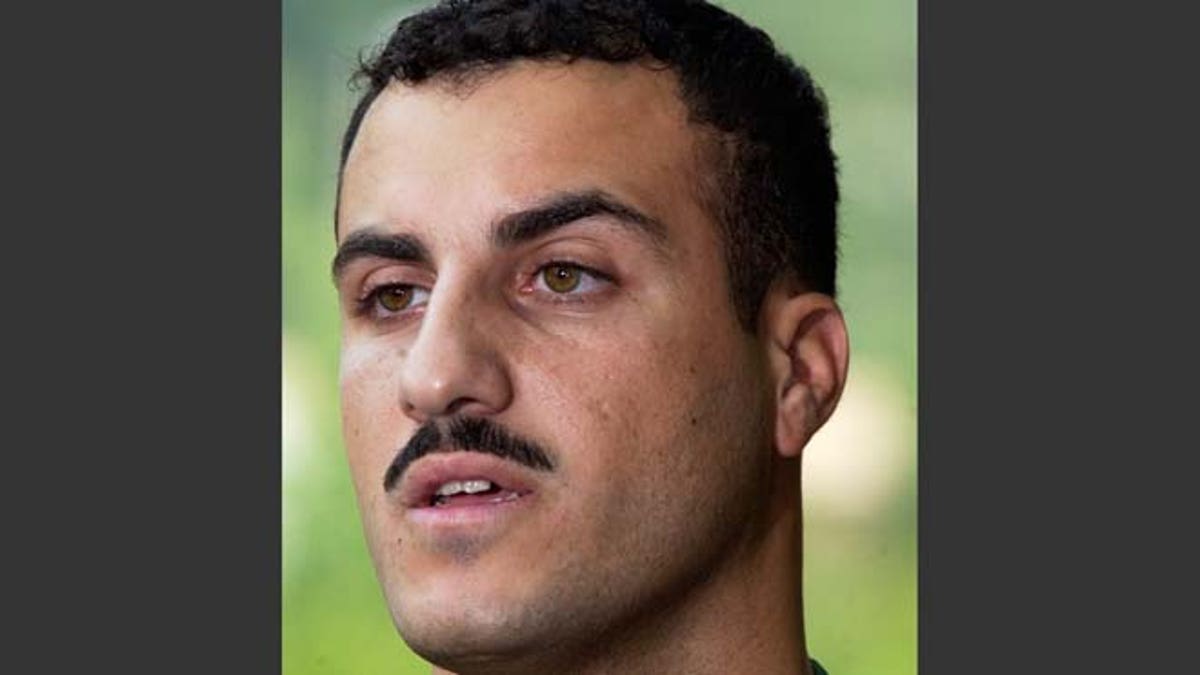
July 19, 2004: In this file photo, Marine Cpl. Wassef Ali Hassoun makes a statement to the media outside Quantico Marine Base in Quantico, Va. (AP/File)
RALEIGH, N.C. – A U.S. Marine who vanished from his unit in Iraq and later wound up in Lebanon for eight years will face trial on desertion and other charges, the military said Friday.
Maj. Gen. William D. Beydler has referred 34-year-old Cpl. Wassef Hassoun for a general court-martial on charges of desertion, larceny and destruction of government property, according to a news release from the Marines. No date has been set for Hassoun's trial at Camp Lejeune in North Carolina, where he is being held.
The case began in June 2004, when Hassoun disappeared from a base in Fallujah, Iraq. About a week later, he appeared in a photo purportedly taken by insurgents. Hassoun was blindfolded and had a sword poised above his head.
Hassoun, a naturalized American citizen who was born and grew up in Lebanon, turned up days later at the U.S. Embassy in Lebanon saying he was kidnapped by extremists.
But the military doubted his story, and he was brought back to the U.S. while charges were considered. He was allowed to visit relatives in Utah in December 2004 when he disappeared again — eventually winding up back in Lebanon.
Defense attorney Haytham Faraj argues that Hassoun was prevented from leaving for years by Lebanese authorities and came back to the U.S. after travel restrictions were lifted.
Faraj, himself a former Marine, said he's seen many similar cases dating to the Vietnam era in which the desertion charge was changed to unauthorized absence, and service members were given administrative punishment. To prove desertion, the military must show a serviceman intended not to come back.
"The intent to remain permanently away isn't there," Faraj said. "Here we have a clear case of a person who came back."
Faraj has said the report by the military equivalent of a grand jury hearing notes that the case consists mostly of circumstantial evidence and that many witnesses, including some in Iraq, would be hard to find.
Military prosecutors argue Hassoun was unhappy with his deployment and left the Marines in Iraq in 2004. They cited witnesses who said Hassoun didn't like how the U.S. was interrogating Iraqis and that he said he wouldn't shoot back at Iraqis.
Military officials say a marriage for Hassoun had been arranged with a woman in Lebanon. They are now married and have a son who has dual U.S. and Lebanese citizenship.
Faraj, who maintains the kidnapping story is true, has said his client traveled to Lebanon in early 2005 while on leave and was soon arrested. Faraj argues that court proceedings in Lebanon were triggered by the U.S. charges against Hassoun.
Marine prosecutors say Hassoun's whereabouts were unknown for eight years. He was returned to the U.S. in 2014 after he contacted officials here.
Translated Lebanese government documents provided to the court say Hassoun was arrested in 2005 by Lebanese authorities after Interpol issued a bulletin triggered by his status as a deserter. The documents, which the defense also gave to The Associated Press, say Lebanese authorities released him but took his passport and prevented him from traveling.
The documents indicate that Lebanese officials declined to extradite Hassoun and he was eventually fined for theft of military tools — a charge that mirrors the U.S. larceny count.

